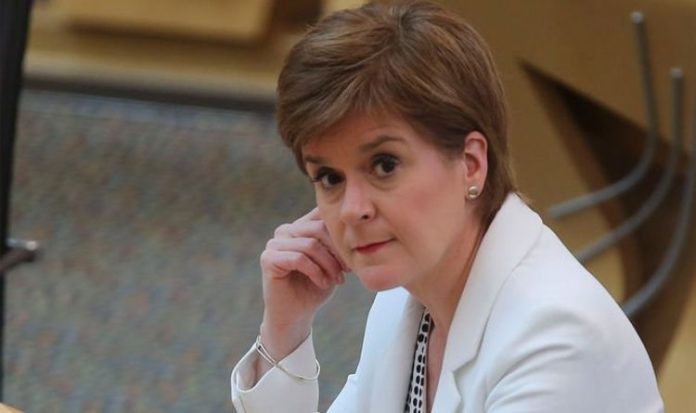The latest polls provide the First Minister with a huge boost as support for Scottish independence appears to grow. The survey by Panelbase showed 55 percent in favour of breaking with the union, with 45 percent against – an exact reversal of the 2014 referendum result. The SNP is reviving its push for a second vote on independence, as Ms Sturgeon pledged to publish draft legislation for a new vote before next May’s elections for the parliament in Edinburgh. While she will want to capitalise on the sustained support for an independent Scotland, damning economic statistics could derail the SNP’s momentum.
This is because the latest Government Expenditure and Revenue Scotland analysis of the health of the economy, has shown that the Scottish “notional deficit” stands at 8.6 percent – £15.1billion – compared to 2.5 percent for the UK as a whole.
This figure represents an increase of £2billion on the previous year.
Further, it rises to 9.4 percent – £15.9billion – if North Sea revenues are excluded.
The report also shows that despite rising tax revenues overall, Scotland’s public sector take is £12,058 per person, £308 less than the UK average, while expenditure levels mean that on average, spending per person in Scotland is £1644 higher than on those living elsewhere in the UK.
The statistics haven’t led to a break in party lines, as Scottish nationalists argue an independent Scotland would have the powers to make “different choices, with different economic budgetary results”.
Meanwhile, conservatives in Holyrood said the new figures proved the benefit of the “pooling and sharing” of resources across the UK.
As British politics expert Dr David Jeffery highlights, the deficit increase could hurt the SNP’s push for independence.
He pointed to a poll by Survation for Progress Scotland in October 2019, which found that in a second independence referendum, undecided voters were more likely to think independence would be good for the Scottish economy in the long run (35 percent to 19 percent).
READ MORE: Nicola Sturgeon’s IndyRef2 hopes dashed as ‘polls won’t secure vote’
“The GERS figures will be used heavily by unionists to firm up their support and to convince waivers.”
Expert in public law, Professor Aileen McHarg, told Express.co.uk last month that the growth in support for independence won’t change the legal argument for the SNP, but could boost Ms Sturgeon’s political case.
She said: “The growth in support does not change the legal arguments. Either they have the power or they don’t – a mandate makes no difference.
“The reason a mandate is important though is because in 2011, when the SNP last won an overall majority, David Cameron’s agreement to facilitate a referendum at that point had a mandate.
“So the SNP will make it absolutely abundantly clear in their manifesto next year that they want a second referendum.
“If the SNP then gets an overall majority next May, then it will be difficult to dispute that mandate, but that’s a political argument.
“It doesn’t affect the legal argument, a mandate on its own can’t impact the powers of a devolved legislature.”







